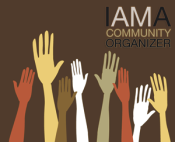If we could see our situation for what it is, we would storm the walls of America's prisons from within and without, preferring to die at the feet of our captors than to continue in bondage...
Black Americans will eventually look back on the 20th and early 21st centuries with a kind of uncomprehending horror and ask ourselves how, after centuries of slavery, we subsequently submitted to over a century of increasing incarceration that was just as bad as slavery?
Our numbers are now divided between free Blacks and incarcerated Blacks, just as we were once divided between free Blacks and slave Blacks. Some of us have been released from prison, perhaps temporarily, just as some of us once bought our freedom from slaveholders, only to be tricked or kidnapped back into slavery again.
Consult the well-publicized Black imprisonment statistics and studies, if you still feel any need to do so, or just skip the following quotation and continue to the meat of this essay:
In the last two-and-a-half decades, the prison population has undergone what the United States Bureau of Justice Statistics director Jan Chaiken last year called "literally incredible" expansion. Chaiken reported a quadrupling of the U.S. incarceration rate since 1975.
( . . . )
On any given day, Chaiken reported, 30 percent of African-American males ages 20 to 29 are "under correctional supervision" ‹either in jail or prison or on probation or parole.
Especially chilling is a statistical model used by the Bureau of Justice Statistics to determine the lifetime chances of incarceration for individuals in different racial and ethnic groups. Based on current rates, it predicts that a young Black man age 16 in 1996 faces a 29 percent chance of spending time in prison during his life. The corresponding statistic for white men in the same age group is 4 percent. According to Thomas K. Lowenstein, director of the Electronic Policy Network, 7 percent of Black children- nearly 9 times more than white children- have an incarcerated parent.
( . . . )
Researchers and advocates tracking the impact of mass incarceration find a number of devastating consequences in high-poverty Black communities. The most well known form of this so-called "collateral damage in the war on drugs" is the widespread political disenfranchisement of felons and ex-felons. Ten states deny voting rights for life to ex-felons. According to the Sentencing Project, 46 states prohibit inmates from voting while serving a felony sentence, 32 states deny the vote to felons on parole, and 29 states disenfranchise felony probationers. Thanks to these rules, 13 percent of all Black men in the U.S. have lost their electoral rights- "a bitter aftermath," notes British sociologist David Ladipo, "to the expansion of voting rights secured, at such cost, by the freedom marches of the fifties and sixties."
In future decades, even America's whites will look back upon on us with pity and condescension, wondering how a people such as we could have tolerated such oppression as our systematic imprisonment without revolting. And revolting, they will know intuitively, is precisely what they would have done in our circumstances. They will know in their hearts that they would never have tolerated being treated as we were, incarcerated en masse while our situation was debated in the press, on television, in the halls of Congress, state capitols and in college sociology courses.
Just as many whites in the antebellum period argued that our inhumanity made our enslavement the natural order of things, now many whites argue that the War on Drugs (which is the single largest rationalization for Black incarceration) necessitates and rationalizes our imprisonment today.
To ensure that whites' consciences will be free of guilt and that Blacks will submit in the belief that we deserve our fate, we are told that Blacks are inherently criminal, just as we were once assured that Black slaves were inherently Godless, animal, inhuman and inferior.
As an American nation, we endlessly ponder the "reasons" (rationalizations and excuses) for Black mass incarceration, without ever simply declaring that it is wrong and cannot be allowed to continue another day, which is the position that the most courageous abolitionists declared and tirelessly argued and insisted upon with respect to the enslavement of themselves and others in their time.
To ensure that whites' consciences will be free of guilt and that Blacks will submit in the belief that we deserve our fate, we are told that Blacks are inherently criminal, just as we were once assured that Black slaves were inherently Godless, animal, inhuman and inferior.
As an American nation, we endlessly ponder the "reasons" (rationalizations and excuses) for Black mass incarceration, without ever simply declaring that it is wrong and cannot be allowed to continue another day, which is the position that the most courageous abolitionists declared and tirelessly argued and insisted upon with respect to the enslavement of themselves and others in their time.
The question is not what Black people have done to deserve to be imprisoned. The issue is that Black people deserve to be free and we must be free, whatever the cost.
If we could see our situation for what it is, we would storm the walls of America's prisons from within and without, preferring to die at the feet of our captors than to continue in bondage, fabricating garbage at slave wages for capitalist corporations while inside prisons, or waiting for our turn at the wheel during the fleeting and fragile moments when we "free" Blacks remain "free." In fact, we are never free from the threat of sudden imprisonment.
We each have individual reasons why we cannot revolt, but we cannot escape our collective responsibility. May God help us, for we will never comprehend tomorrow how we could so cowardly submit ourselves today.






No comments:
Post a Comment